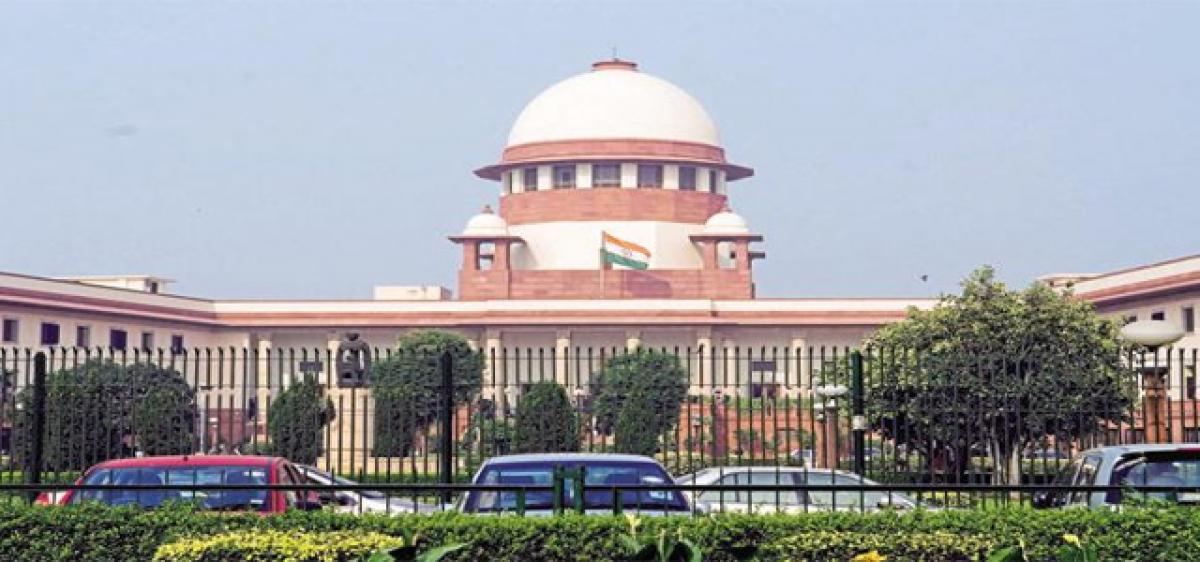Constitutionality of Bifurcation

The Supreme Court agreed to hear all the petitions together filed against the Andhra Pradesh State Reorganisation Act, 2014. The hearing will not have any real impact on the ground. It may at best end up as an academic exercise as the Constitutional provisions are quite clear.
The argument that AP State Reorganisation Act was passed amidst confusion and chaos is most unlikely to stand the scrutiny of law. Assuming that the argument is a valid objection, the parliamentary proceeding cannot be questioned in courts unless there is a substantial case of illegality. Even if the court agrees with the contention of the petitioner over the manner in which the bill was passed, it would only be a case of irregularity that cannot be the subject of judicial review. Also, seeking the views of the legislature to be affected is mandatory, but not binding on Parliament
The Supreme Court agreed to hear all the petitions together filed against the Andhra Pradesh State Reorganisation Act, 2014. The hearing will not have any real impact on the ground. It may at best end up as an academic exercise as the Constitutional provisions are quite clear.
The politicians and parties deliberately whipped up emotions and misled people on the constitutional process. Bifurcation of a state is essentially a political act, though executed through the mechanism of Constitution. The leaders and parties distorted the whole debate to hide their political expediency.
The bifurcation process is complete. The two states are on their own. As the apex court bench itself wondered, is it necessary to hear the case?
The argument that the State Reorganisation Act was passed amidst confusion and chaos is most unlikely to stand the scrutiny of law. Assuming that the argument is a valid objection, the parliamentary proceeding cannot be questioned in courts unless there is a substantial case of illegality.
Even if the court agrees with the contention of the petitioner over the manner in which the bill was passed, it would only be a case of irregularity that cannot be the subject of judicial review.
In fact, we have seen many fallacious arguments on the constitutional questions during the debate over the bifurcation both inside and outside the Legislature. Not that the political leadership was unaware of these provisions.
The attempt was to encash the constitutional illiteracy widely prevailing in India to serve political ends. It’s worth repeating these provisions whether one likes them or not to avoid being further hoodwinked by political bankruptcy.
The prominent politico-constitutional question often was raised is with regard to the role of Parliament and the state legislature in the process of bifurcation. The first question is on Article 3 of the Constitution. The demand for bifurcation is essentially a question to be settled in political process.
Then political process decisively favoured such a bifurcation of Andhra Pradesh. Raising constitutional questions in the highest judiciary does not serve any purpose as the political process operates on what the Constitution says today, not on what the Constitution should have been.
The Article 3 of the Constitution clearly keeps the power to bifurcate in the exclusive domain of Parliament. The Supreme Court of India has repeatedly upheld this. The state legislature is accorded only a consultative role that has no binding on the Parliament.
The Parliamentary majority for bifurcation of Andhra Pradesh was very clear. Yet, the chaos was only to demonstrate the duplicity of various political parties.
Article 3 makes three things clear: (1) A state is bifurcated by an Act of Parliament and Parliament only. (2) Before enactment by Parliament, the President has to refer the draft bill to the legislature. (3) The legislature has to express its views.
Therefore, seeking the views of the legislature to be affected is mandatory for Parliament before bifurcating a state. But the views of the legislature are not binding on Parliament. Parliament can make a law bifurcating a state in whatever manner it deems fit, independent of whatever may be the views expressed by the legislature concerned. The legislature was given only a consultative role.
Any argument that such a provision goes contrary to federalism is a political question which needs to be settled through the political process. The constitutional interpretation of Article 3 cannot be determined by political arguments (Parliament, State Legislature and Bifurcation, K Nageshwar, Economic and Political Weekly, 18 Jan 2014).
The Supreme Court in Pradeep Chaudhary and Ors vs. Union of India(2002) defined the meaning of the word expression of its views. It said, “….While a power to introduce the Bill is kept with the Parliament, ‘consultation’ with the State Legislature although is mandatory but its recommendations were not binding on the Parliament.
‘Consultation’ in a case of this nature would not mean concurrence. The Parliament would not be bound by the views of the State Legislature.”
The respective roles of Parliament and the state legislature figured even in the constitutional debates. Should the prior consent of the affected legislature be insisted upon? This was even debated in the Constituent Assembly. An amendment was adopted making the role of the state legislature concerned merely consultative.
The Supreme Court clarified in Babulal Parate vs The State of Bombay and Another( 1959): “All that is contemplated is that Parliament should have before it the views of the State Legislatures as to the proposals contained in the Bill and then be free to deal with the Bill in any manner it thinks fit, following the usual practice and procedure prescribed by and under the rules of business.”
The most important criticism of Article 3 is that it violates federal principles. This question will come up before the Supreme Court when it takes up the cases for hearing.
The Constitutional thinking and interpretation for according such a paramount power for Parliament in regard to bifurcation of a state is that if a minority territory within a united state wants to be separated, the mandatory consent of the affected legislature would make reorganisation of state impossible. This opinion was expressed even in the Constituent Assembly debates.
In fact the Andhra Pradesh High Court in P V Krishnaiah vs Union of India (2013) said, “...The Article 3 has been designed in such a way that enables the Parliament essentially to maintain the concept of federalism. The Federal character of the Constitution is reserved by Article 3 of the Constitution of India …”.
The Constitution itself imposes certain limits on federalism. India is an indestructible union of destructible states. The remapping of states is therefore a simple exercise under the Indian Constitution.
The Constituent Assembly rejected a motion in the concluding stages to designate India as a “Federation of States.” B R Ambedkar, while introducing the Draft Constitution, explained the position thus:
“...that though India was to be a federation, the federation was not the result of an agreement by the States to join in a federation, and that the federation not being the result of an agreement, no State has the right to secede from it. The federation is a Union because it is indestructible.
Though the country and the people may be divided into different States for convenience of administration, the country is one integral whole, its people a single people living under a single imperium derived from a single source. The Americans had to wage a civil war to establish that the States have no right of secession and that their federation was indestructible…”
Thus the reorganisation of a state by an Act of Parliament can be questioned on political grounds but invoking constitutional provisions would be futile.
The Supreme Court in both Babulal Parate and Pradeep Chaudhary cases opined:
“...none of the constituent units of the Indian Union was sovereign and independent in the sense the American colonies or the Swiss Cantons were before they formed their federal unions.
The Constituent Assembly of India, deriving its power from the sovereign people, was unfettered by any previous commitment in evolving a constitutional pattern suitable to the genius and requirements of the Indian people as a whole.
Unlike some other federal legislatures, Parliament, representing the people of India as a whole, has been vested with the exclusive power of admitting or establishing new States, increasing or diminishing the area of an existing State or altering its boundaries, the Legislature or Legislatures of the States concerned having only the right to an expression of views on the proposals. It is significant that for making such territorial adjustments it is not necessary even to invoke the provisions governing constitutional amendments…”
The Supreme Court in Berubari case (1960) said “…the Federation was not the result of a pact or union between separate and independent communities of States who came together for certain common purposes and surrendered a part of their sovereignty.
The constituent units of the federation were deliberately created and it is significant that they, unlike the units of other federations, had no organic roots in the past. Hence, in the Indian Constitution, by contrast with other Federal Constitutions, the emphasis on the preservation of the territorial integrity of the constituent States is absent…”
The Supreme Court in Mullaperiyar case(2006) said that the power of the Parliament to reorganise states is ‘paramount,’ ‘plenary,’ ‘supreme and exclusive’ and “cannot be questioned on ground of lack of legislative competence”. It’s most unlikely that the apex court would revisit the decades of Jurisprudence now.

















